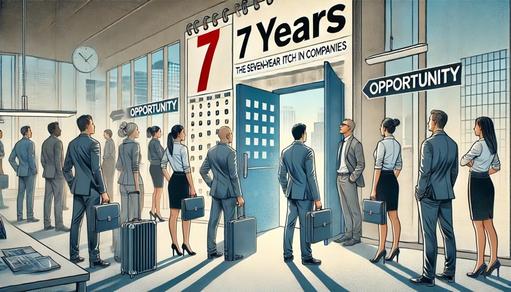- In 2024, Gen Z surpassed Baby Boomers in the US workforce, triggering cultural shifts
- Their emphasis on flexibility, purpose, and mental health may amplify professional restlessness, pushing organisations to adapt
- Gen Z employees may seek change after a few years, driven by unmet expectations, a desire for impact, and a need for novelty
- Addressing this "seven-year itch" through growth opportunities and meaningful engagement can help retain top talent
- This Commentary provides actionable strategies to align with Gen Z priorities, essential for attracting and keeping young leaders
The Seven-Year 'Itch' in Companies
The workplace is undergoing a generational shift, with Generation Z (Gen Z) surpassing Baby Boomers in 2024 as the largest group in the US full-time workforce. This transformation introduces a new set of values, expectations, and behaviours that challenge traditional workplace norms. Gen Z’s ethos - characterised by a strong emphasis on purpose, flexibility, and inclusivity - may accelerate cycles of professional restlessness, reshaping the structures and dynamics of modern organisations.
The concept of the "seven-year itch", often associated with phases of dissatisfaction in personal relationships, finds a parallel in the corporate world. Employees, particularly those who feel their career trajectories have stagnated, frequently experience similar restlessness after years in the same role or organisation. This professional “itch” often arises from unmet expectations, a lack of growth opportunities, and the intrinsic human desire for change.
For leaders, this turning point can prompt a reassessment of goals, ambitions, and alignment with organisational values. Without meaningful challenges or a clear path forward, many employees are driven to explore new opportunities - not from disloyalty, but from a need for professional fulfilment and purpose. Like personal relationships, professional careers often begin with optimism and ambition, yet can become routine as visionary goals give way to operational demands. Recognising and addressing this restlessness is essential not only for individual growth but also for sustaining long-term organisational success in an evolving business landscape.
In this Commentary
This Commentary explores the concept of the "seven-year itch" in professional contexts, examining why employees often experience restlessness or dissatisfaction after a period in a role. It delves into the expectation gap, the search for impact, and the human need for novelty, highlighting organisational implications. The Commentary also considers how Generation Z's workplace values - such as flexibility, purpose, and mental health awareness - may accelerate this phenomenon, urging companies to adapt for sustained engagement and retention.
The Expectation Gap: A Key Catalyst for Discontent
The "seven-year itch" in a professional context often arises from a growing disparity between employees' aspirations and the realities of their role. This disconnect is likely to intensify as Gen Z increasingly replaces Baby Boomers in the workforce, reshaping workplace dynamics. For high achievers, who are accustomed to consistent recognition and advancement, such misalignment can be disheartening. Career trajectories often serve as a cornerstone of identity and self-worth, making stagnation - whether due to organisational barriers, limited promotional prospects, or uninspiring projects - feel personal. This divergence between ambition and reality fosters frustration, gradually eroding both satisfaction and motivation.
A Quest for Meaning and Impact
For many Gen Z employees, titles and compensation alone are insufficient; their drive is fuelled by the desire to create meaningful change. Yet, as time passes, some may find their influence waning, their ideas side-lined, or their contributions no longer yielding significant outcomes. This reduction of impact can lead to a sense of disillusionment, sparking a search for roles or organisations where they can regain a sense of purpose, reconnect their efforts to meaningful outcomes, and align their work with their core values.
The Draw of Novelty and Renewal
Humans thrive on novelty, and employees are no exception. Just as personal relationships can lose their spark without renewal, professional roles can grow monotonous when stripped of fresh challenges. Many people excel in dynamic environments that require innovative thinking and problem-solving. When their roles become predictable or routine, the allure of a new setting - one that offers variety, fresh perspectives, and opportunities - becomes irresistible, compelling them to seek renewal in their careers.
Organisational Implications of the Professional Seven-Year Itch
Just as the "seven-year itch" can lead individuals in relationships to reconsider their commitments, a similar phenomenon in the corporate world prompts employees to question their professional loyalty. When growth, impact, and variety are lacking, talented individuals may feel driven to move on, seeking roles that better align with their aspirations for personal and professional fulfilment. Recognising this tendency is valuable for organisations, as it offers an opportunity to structure career paths that maintain people's engagement and satisfaction, potentially reducing turnover among high performers.
A Generational Shift: The Influence of Gen Z on the Seven-Year Itch
Smart leaders will recognise this shift as an opportunity rather than a disruption, proactively aligning organisational practices to these emerging priorities. By fostering purpose-driven cultures, embracing flexible work arrangements, investing in skills-based development, and prioritising mental health and wellness, forward-thinking executives can engage and retain Gen Z talent. Organisations that anticipate and respond to these expectations with agility and authenticity will not only adapt to the changing workforce but position themselves as employers of choice in an evolving business landscape. To assist in this regard, here are the changes Gen Z are expected to bring to workforces. 1. Purpose-Driven Work and Social Impact Gen Z places a premium on purpose-driven careers, seeking roles that enable them to create a meaningful and positive impact. For this generation, work transcends financial security - it serves as a platform for driving societal and environmental change. Employers will increasingly face pressure to implement and transparently communicate socially responsible initiatives that resonate with these values. To attract and retain Gen Z talent, companies must embed these priorities into their operations, demonstrating a commitment to sustainable and ethical practices. 2. Digital Native Advantage and Technology Expectations Raised in a tech-driven era, Gen Z has an innate proficiency with digital tools and a strong expectation for workplaces to match their technological fluency. They are drawn to companies that embrace innovation, prioritise cybersecurity, and adopt advanced, tech-enabled work models. Organisations slow to adapt risk losing out on this digitally savvy talent pool, as Gen Z seeks employers that leverage cutting-edge technologies and foster forward-thinking, agile environments. 3. Flexibility, Autonomy, and Work-Life Balance The traditional 9-to-5 schedule often holds limited appeal for Gen Z, a generation that values flexibility, autonomy, and work-life balance. They are advocates for hybrid and remote roles, which empower them to manage their time more effectively and work in ways that align with their personal and professional priorities. To attract and retain this talent, companies must rethink conventional work structures, offering adaptable schedules and redefining career pathways to foster environments that prioritise individuality, productivity, and wellbeing. 4. Career Growth and Development Focus Gen Z challenges the traditional career ladder by prioritising skills-based growth, lateral moves, and opportunities for continuous learning over hierarchical promotion. They value environments that provide regular feedback, mentorship, and diverse development opportunities, seeking roles that allow them to build adaptable, future-ready skill sets. This generational mindset motivates companies to rethink professional development strategies, investing in training programmes, mentorship initiatives, and personalised growth pathways. 5. Diversity, Equity, and Inclusion as Non-Negotiables Diversity, equity, and inclusion (DEI) are non-negotiables for Gen Z, who expect meaningful and authentic efforts rather than gestures. This socially conscious generation values workplaces that champion inclusivity, representation, and fairness at every level. Companies that fail to cultivate a genuinely inclusive culture risk disengagement and high turnover among Gen Z employees. To meet these expectations, organisations must prioritise diverse hiring practices, implement impactful DEI training programmes, and establish equitable policies that foster belonging and promote long-term cultural change. 6. Mental Health Awareness and Wellness Mental health is a priority for Gen Z, a generation that actively advocates for workplace wellness and openly addresses mental health challenges. They seek employers who normalise conversations around mental wellbeing and demonstrate a commitment to supporting it. To meet these expectations, companies must create a culture of psychological safety, offering comprehensive wellness programmes, flexible mental health days, and access to professional counselling as part of standard benefits. By prioritising mental health, organisations can foster a more engaged and resilient workforce. 7. Transparency and Trust Transparency is a cornerstone value for Gen Z, who tend to be sceptical of organisations that operate without openness or clarity in decision-making. This generation seeks employers who foster trust through honest communication and actively involve employees in shaping workplace policies and strategies. To engage and retain Gen Z talent, companies must prioritise transparent leadership, encourage open dialogue, and create opportunities for meaningful employee input. By adopting these principles, organisations can build trust and strengthen their connection with this discerning workforce.
The findings from the 2024 CYPHER Learning study underscore these seven needs, revealing that tailored learning, supportive management, and trust are essential to retaining younger talented employees. By investing in customised training and development programmes, fostering transparency, and supporting mental health and wellness, companies can create environments that meet the evolving expectations of Gen Z, fostering long-term engagement and satisfaction in the workforce of tomorrow.
Takeaways
The "seven-year itch" in the workplace may be taking on a new, accelerated meaning as Gen Z reshapes workforce dynamics with their distinct values and priorities. This generation, entering their careers with a strong emphasis on growth, purpose, autonomy, and inclusivity, is driving an era where job satisfaction and organisational alignment are reassessed more frequently. Unlike previous generations, Gen Z's expectations for meaningful work and rapid professional development create a challenge - and an opportunity - for companies. Employers who embrace this shift by fostering environments of transparency, inclusivity, and flexibility will not only navigate higher turnover rates but also build stronger, more resilient teams. By prioritising professional development and aligning with the evolving expectations of their workforce, organisations can position themselves as leaders in attracting and retaining top talent in an era of dynamic workplace transformation. Recognising this shift is not optional but essential to thriving in the modern world of work.
|



